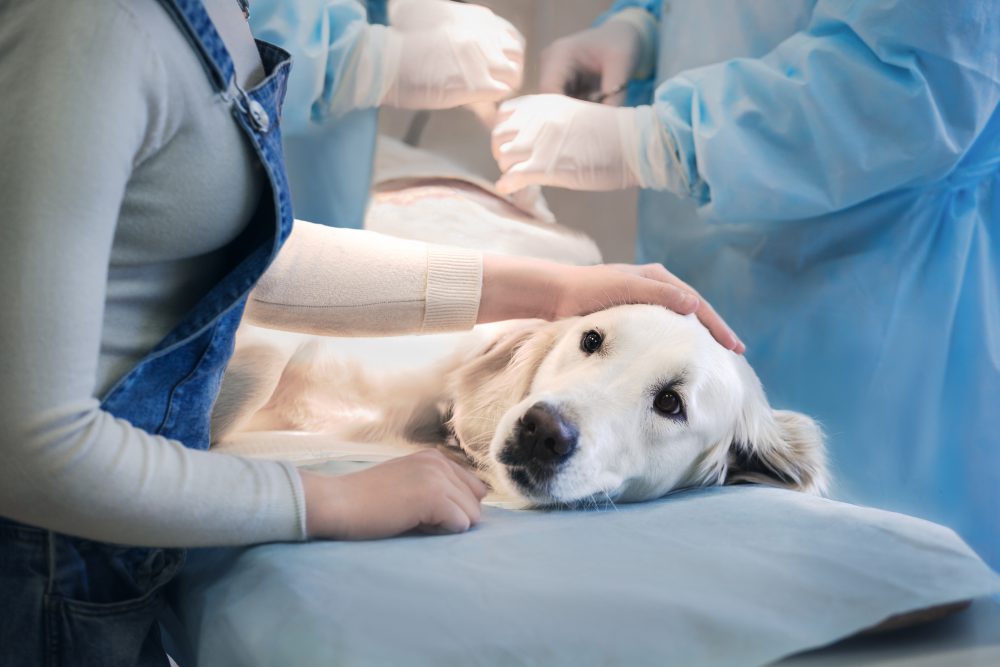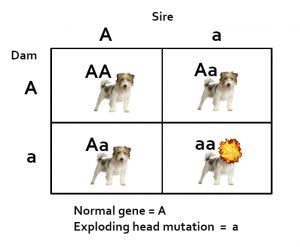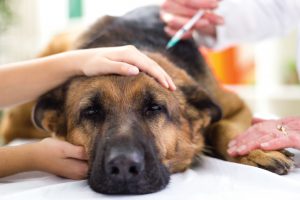
Puppy Buyer 101: “Have you produced health issues?”
One thing we all want in life is a silver bullet, or a definitive answer of what is the right thing to do. As breeders, we would love a guarantee that we are doing everything possible to ensure the health of our breed and puppies, and that our dogs will live long long lives in which they will never be sick and pass away peacefully in their sleep at the age of 16 (how about 30?) But one sad reality of animals is just that: they are animals. No matter how carefully a breeder researches a potential mate, scrutinizes the pedigree behind it, and health tests their dogs, health issues can arise by plain dumb luck or lurking genetic defects, most of which are complex and we have no way of testing. And, unfortunately, most health testing we have is for the simple diseases, the ones that are not truly plaguing our dogs. (This is not to say we should not health test our breeding animals, of course!)

An example of a simple recessive from Natalie’s blog post “Let’s talk about COI and other estimates of inbreeding”
There are many types of diseases that breeders are dealing with in gene pools. The most well understood are what we call simple recessives. A simple recessive disease needs two copies of the mutation to express disease. If a dog has one copy of this disease mutation, there is no issue breeding them as long as they are bred to a dog that does not also carry that same mutation. When breeders have genetic tests for these, they are easy to manage. An example of this is PRA, or progressive retinal atrophy. It is safe to breed a carrier of PRA to a non-carrier. Most diseases, however, are not simple recessives, and no known single mutations for them can be tested for by the breeder. These are called complex diseases and these are the genetic diseases that are most problematic. Many times these diseases likely also have an environmental component, meaning they are triggered by the something in the environment. Addison’s disease is often considered to be a complex disease with an environmental trigger. Another example of a complex health issue is hip dysplasia, which is found mutually in purebred dogs and mixed breeds, and it is likely the environment – like food or slippery floors for puppies – contributes to its development.
So what should you expect when you ask a breeder if they’ve produced health problems? A breeder should be honest. Don’t be scared if they say, yes, they have. The reality is, as dogs age, something will rear its ugly head. I often say to people, “we are breeding animals, not building machines” (and even machines can often have flaws, though they are more easily fixed and much less heartbreaking.) This is particularly true for breeds with large litters, since the genetic roll of the dice is made many times over; as these large litters age, one will be likely to have an issue.
So, say, a breeder always waits to breed their dogs til they are 4 years old, and the dog they are breeding now was from a litter of 10. Once you are at the third generation out, the granddams and grandsires (grandparents) are 12 and all of their siblings as well. That means likely some health issue will have shown up in one of these relatives. And this is good, because the breeder may then breed away (look for breeding mates without relatives with that same disease) from this health issue.
Say another breeder always breeds their dogs at age 2. By the third generation the grandsire and granddam (and their siblings) will only be 6. In this case, the health issues may well not have shown up yet, and therefore the breeder can say they have had no health issues, but may unwittingly be breeding dogs with health issues not yet seen due to the young age of the generations of the line. There is a saying that we have heard in the breeding world: “If a breeder can say they have not produced health issues, they’ve either not bred long enough, or they are lying.” We’ll add a third to this: or they do not keep in touch with their puppy homes.
Even dogs with no pedigree have health issues, and not always at lesser rates than purebred dogs, as found by UC Davis. According to UC Davis, “If you think your mixed-breed pup is naturally hardier than the neighbor’s purebred, you may want to think again. A new study by researchers at the University of California, Davis, indicates that mixed breeds don’t necessarily have an advantage when it comes to inherited canine disorders.” Of course, mixed-breed dogs are not usually carefully bred, meaning they are not health tested.
Add to this equation: environment. How many vaccines, exposure to toxins, diet etc all may play a role in the health of an animal just as it does in humans. This point is evidenced by the recent findings regarding dilated cardiomyopathy and expensive dog foods. Breeders cannot control for this issue, so there may be a very real effect of environment on the health of a line that might trigger a predisposition, or just cause a problem that may not have occurred otherwise. Unfortunately, there may be no cut and dried way to know, unless a health issue is breed specific and prevalent in that breed.
Another way to consider this is our own human families. Humans in general are outbred, with a lot of genetic diversity. How many of us can say our families have no health issues? Take the extreme example though, the Hapsburg family, whose inbreeding insured the demise of their line. This could be correlated to the rise in disease in dog breeds, especially those with breed specific bottlenecks, high rates of inbreeding and reduced genetic diversity.
So, we cannot hope for no health issues. What, then, can we hope for?! If you want to ask about health issues, perhaps ask what they do in the event that some disease appears. Many breeders will offer some sort of guarantee, should their puppies develop a verifiable genetic condition. This guarantee will vary among breeders, so make sure to inquire. It is not likely reasonable to expect a breeder to cover your veterinary’s testing or treatments in the event that your puppy develops a health issue. However, a breeder should welcome news of the health issue so they know what they have produced. Should they cull their line? It probably depends on the severity of the disease, the number of dogs affected, the status of the breed (if it’s bottlenecked or not), the complexity of the disease and the individual breeder’s tolerance for said health issues. While there is no set perfect answer, the breeder should at least make an attempt to breed away from the issue produced.
In an ideal world we could purify gene pools, but the reality is that removing all lateral relatives to a sick dog will purge a gene pool – but not in the way we might think. It will purge it of its genetic diversity rapidly, leaving a severe bottleneck which will result in more disease. The best way to manage complex diseases is not to breed affected dogs and to manage a gene pool so more biodiversity is not lost. If a relative has a health issue, breeders may wait until potential breeding stock has aged to know the extent of the disease within the line. If the health issue is breed specific, then the breeder should use diversity testing to breed away from a genetic bottleneck, which will breed away from these issues if there is enough genetic diversity within the gene pool to do so. It’s also important to note that in some breeds there will be no line clear of an issue. Breeders must be careful not to “throw the baby out with the bath water.”
Some breed communities are very harsh to breeders who have health issues, which can foster an environment in which breeders are afraid to share what they’ve produced, whether they are show breeders, or breeding an “unknown” pet line. This type of community is undesirable! Some gene pools are healthier and tend to have less issues in general, while others have genetic bottlenecks concentrating disease. The best breeding communities are supportive of one another and work to solve these issues together, and breeders are open and honest about the health of their lines. Homes can help with fostering this environment by not passing judgment while encouraging breeders who practice this sort of mentality.

 Previous Post
Previous Post Next Post
Next Post


